If Castlevania, Super Mario Bros., and Pokémon never existed, could they be invented from scratch today?
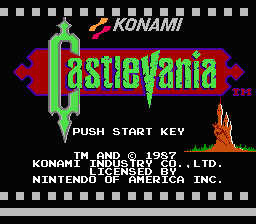
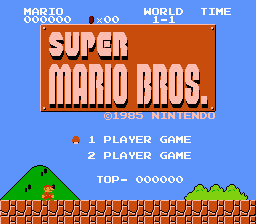
.png)
Game development is, for both better and worse, not what it used to be; the monetary costs and time costs to create Grand Theft Auto IV are lightyears apart from Street Fighter II. When games are Hollywood-level productions with Hollywood-level expenses, one misstep can sink a company—and so, to the best of each company’s abilities, with every statistic available to them, their number crunchers need to determine a priori whether their games will sell based on the history of their series and comparable series.
In the modern world, big game developers craft their games from market statistics. Some gamers love it (“give me bigger and better”) and others hate it (“give me something original”), but either way, developers do that because, in a real and literal way, they can’t afford otherwise. Market statistics can’t breed innovation, however; no one can create the future by replicating the past. When the game industry was still young, companies needed to pioneer new ideas because they had no comfort zone of existing trends and bandwagons to follow.
Konami could not have created Castlevania in this millennium. My pitch as the creator: Simon Belmont, a descendant of vampire hunters, battles Dracula and the undead with the Vampire Killer, a holy whip passed down over countless generations. My response as the publisher: a guy fights Dracula with a whip? Nobody buys into characters with whips unless they’re Indiana Jones. Give this Belmont guy knives like in Blade or guns like Resident Evil and House of the Dead. Make him more generic because then he’ll be a safer bet.
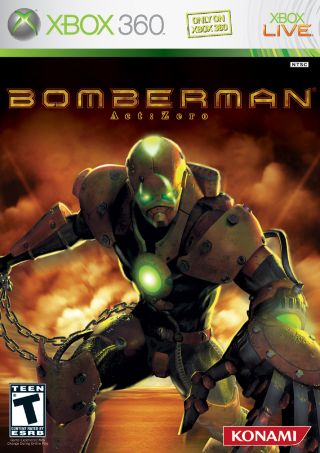
The scary side of appeasing market trends. 6-3-2012 update: would you believe that I wrote all of the above without even remembering that Konami rebooted Castlevania? I only had their ill-fated Bomberman Act Zero in mind as a point of comparison.
Nintendo could not have created Mario in this millennium. They were reluctant to publish—not even create, but publish—Xenoblade outside of Japan despite owning, publishing, translating, advertising, or otherwise helping to sell RPGs like Pokémon, Paper Mario, Mario & Luigi, Tales of Symphonia, and Dragon Quest IX. Imagine, then, if Shigeru Miyamoto didn’t come up with the idea of a plumber who jumps on flying turtles and grows bigger by eating magic mushrooms until the year 2004. With no Super Mario Bros., Super Mario Bros. 3, or Super Mario 64 in the sales record books, I’d say the only room for the concept of Mario would be where so many insane Nintendo ideas from the modern era go: into small segments of Rhythm Heaven or WarioWare, not full-fledged games.
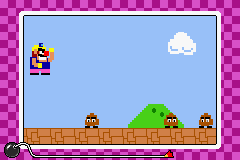
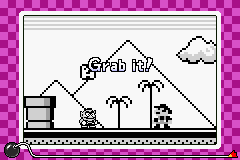
Imagine if these two screens were all the Mario in the world.
It’s difficult for big developers to take risks, but we need them. Without risks, a game developer is doomed to rehash the part of the past that’s not worth rehashing; a developer is doomed to miss the point forever by copying an idea instead of a heart, by copying the skin instead of the soul. Developers can copy the external shell, the exoskeleton, and all of the other physical trappings, but if all they can do is wait for a trend and hop on its coattails, they’ll never amount to anything but a subset of a subset.
Pokémon popped up and shortly afterward came a dripping faucet of knockoffs that nobody remembers and nobody bought. That’s not because of the technical quality of the games. It’s not because the core idea of collecting creatures and fighting other people’s creatures isn’t in demand. It’s because gamers recognize transparent cash-grabs and don’t like them. Of course commercial games are made for profit, but gamers want them to at least have their own vision. Sequels are accepted; knockoffs not so much.
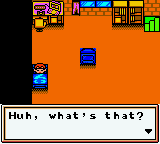
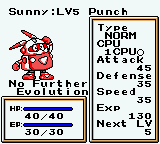
What do you mean “Are you a Pokémon sequel?” No, no, no, we’re Robopon. See, we have robots, not monsters. That makes everything different. What? The new Pokémon Gold and Silver introduce Steel-types? And they retconned Magnemite and Magneton? Oh… crud.
Disclaimers: 1) Pictures are from VGMuseum. 2) I’d totally give this game a fair try if it showed up on 3DS Virtual Console.
As clear as can be:
When a game is criticized for being “formulaic,” that’s not usually an attack on the formula. More often it’s an attack on the developers for copying the formula instead of learning from it. It’s an attack on the developers for being parrots who can repeat great quotations without understanding what they mean; what we want are humans who hear those same quotations, turn them over in their minds, think about the situations in which they apply and the situations in which they don’t, and then adjust and evolve accordingly.
There’s nothing wrong with formulas, or at least nothing so wrong that it would stop people from buying games like Pokémon or Call of Duty. However, big developers with big budgets are forced into formulas—and this is where smaller developers can fill a void.
The creative advantage of the indie game developer is the freedom to break from tradition. An indie team making an RPG doesn’t need its four-character party to be a hero with a big sword, a white mage heroine, a cool dude gunslinger, and a martial artist girl; they could create a party where the weapons of choice are tonfas, chakrams, nunchaku, and electric screwdrivers. A big developer might determine that it’s necessary to include a love interest to boost sales; the indie team says screw “necessary” and makes whatever it wants to make. Not only does the indie team not need to toss in token black guys, the indie team doesn’t need to toss in guys at all. They can make the next Sailor Moon—or they can make the next Dragonball with a non-existent female presence. They can make a game starring androgynous three-eyed androids. They can make the next E.V.O.: Search For Eden since Square-Enix sure won’t.
If Castlevania, Super Mario Bros., and Pokémon never existed, they and all of their idiosyncrasies could only be created today by an indie developer.
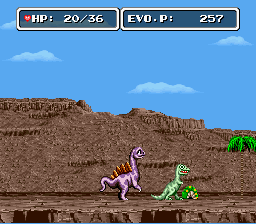
E.V.O.: Search For Eden by Square-Enix, featuring Gaia, the Sun God, evolution, ancient aliens, a dinosaur-destroying comet, and an advanced sky civilization of bird people all in one platformer-RPG package. Likely to die by natural selection unless the indie demigods intervene.
Reiterating: there’s nothing wrong with creating something similar to the past. If you want to make the next WWF No Mercy because you’ve been waiting for one for twelve years, go for it. If you want to make Cave Story, make Cave Story. We’ll love it. Not every game would benefit from a new twist. Just as it’s difficult to imagine a Castlevania where the Vampire Killer became a sword because of tradition, it’s difficult to imagine a Legend of Zelda with a Master Whip because “it’s different.”
The crucial thing for an indie game developer to keep in mind is to stay true to their own dream. If you don’t put your soul and your vision into a game, no one else will. No one else can, not only because of budget constraints and the need to pitch games to publishers, but because every person has a unique vision of what a game should be—and only that person can create that vision as they like.
Indie development teams have numerous obstacles in front of them that bigger companies don’t, to be sure, but any indie team should keep in mind that the ability to explore new ideas is one point in their favor. It may well be the only point they need.

Pingback: Seven Types of Video Game Difficulty | Game Design and Deconstruction
Pingback: Learning How To Design Video Games: A Matter of Play | Game Design and Deconstruction
Pingback: Gaming Innovation: Mythical. Gaming Diversity: Magical. | Game Design and Deconstruction
Pingback: The Indie Developer Seizure: From 2013 to 1997 With Love (and Reciprocity) | Game Design and Deconstruction
Pingback: Dreamblazers Devlog: Week of April 28, 2014 | Project Dreamblazers